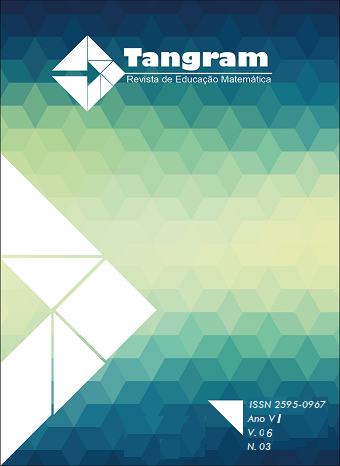University Extension mobilizing mathematical ideas through pedagogical workshops
DOI:
https://doi.org/10.30612/tangram.v6i3.17392Keywords:
Ideias Matemáticas, Extensão, Ensino de MatemáticaAbstract
This article reflects on the realization of an extension project that served as a context for the development of a research with the objective of understanding the training possibilities that arise during extension actions that establish relationships between the mathematical ideas mobilized by the practices developed by the university, school and local artists. To this end, a qualitative research methodology was adopted from the perspective of Yin (2016). For the construction of the data, participant observation was used during the actions developed by the students of the Degree in Mathematics, from the Center for Higher Studies in Parintins, state of Amazonas, with the students of the 5th year of Elementary School during a pedagogical workshop. and conversation wheel. The analytical movement occurred through a triangulation between the results of the workshop and the conversation wheel, which indicated the potential of extensionist actions to mobilize mathematical ideas in school and in the training of future mathematics teachers.
Downloads
References
Alencar, E. A. de, & Souza, J. V. de. (2022). Materiais Concretos em sala de aula: um estudo bibliográfico em teses e dissertações. TANGRAM - Revista De Educação Matemática, 5(4), 74-91. https://doi.org/10.30612/tangram.v5i4.13566
Almeida, L. P. (2015). A extensão universitária no Brasil processos de aprendizagem a partir da experiência e do sentido. DIRE (7): Les universités latino-américaines aujourd’hui: expressions locales. Recuperado de: http://epublications.unilim.fr/revues/dire. 7, 56-67.
Andrade, L. A. P. Superfícies mínimas e bolhas de sabão no Ensino Médio. Dissertação (Mestrado em Matemática) – Universidade Federal do Ceará. Programa de Pós-Graduação em Matemática em Rede Nacional, Fortaleza, 2016.
Coelho, G. C. (2014, jul/dez). O papel pedagógico da extensão universitária. Em Extensão, Uberlândia, 13 (2), 11-24.
Costa, L. F. M., Souza, E. G., & Lucena, I. C. R. (2015, dezembro). Complexidade e Pesquisa Qualitativa: questões de método. Perspectivas da Educação Matemática, 8(18) Recuperado de: https://periodicos.ufms.br/index.php/pedmat/article/view/903.
D’Ambrosio, U. (2011). Etnomatemática: elo entre as tradições e a modernidade. Belo Horizonte: Autêntica Editora.
D’Ambrosio, U. (2022). Transdisciplinaridade e a proposta de uma nova universidade. REMATEC, 17(40), 01-19. https://doi.org/10.37084/REMATEC.1980-3141.2022.n40.p01-19.id507
Gadotti, M. (2017). Extensão Universitária: Para quê? - Instituto Paulo Freire paulofreire.org. Recuperado de: https://www.paulofreire.org.
Gadotti, M. (2000). Pedagogia da Terra. São Paulo: Peirópolis.
Freire, P. (1997). Extensão ou comunicação? Rio de Janeiro: Paz e Terra.
Loizos, P. (2012). Vídeo, filme e fotografias como documentos de pesquisa. In: GASKELL, G. Pesquisa qualitativa com texto, imagem e som: um manual prático. Petrópolis-RJ: Vozes.
Martins, M. M. B., & Pereira, R. B. (2016). A ciência das bolhas de sabão. Barra do Garças-MT, UFMT.
Moran, j. (2018). Metodologias ativas para uma aprendizagem mais profunda. In: BACICH, L., & MORAN, J. (org.). Metodologias ativas para uma educação inovadora: uma abordagem teórico-prática. Porto Alegre: Penso.
Nacarato. A. M., & Custódio, I. A. (2018). O desenvolvimento do pensamento algébrico: algumas reflexões iniciais. In: NACARATO. A. M., & CUSTÓDIO, I. A. O Desenvolvimento do pensamento algébrico na educação básica: compartilhando propostas de sala de aula com o professor que ensina (ensinará). [livro eletrônico]. Brasília: Sociedade Brasileira de Educação Matemática. p. 13-24.
Sousa, A. L. L. (2010). A História da Extensão Universitária. Campinas, SP: Alínea.
Stake, R. E. (2011). Pesquisa qualitativa. [recurso eletrônico: estudando como as coisas funcionam; tradução: Karla Reis. Porto Alegre: Penso, 2011.
Vergnaud, G. (2014). A criança, a matemática e a realidade: problemas do ensino da matemática na escola elementar. Curitiba: Editora UFPR.
Yin, R. K. (2016). Pesquisa qualitativa do início ao fim [recurso eletrônico]; tradução: Daniel Bueno. Porto Alegre: Penso.
Downloads
Published
How to Cite
Issue
Section
License

This work is licensed under a Creative Commons Attribution-NonCommercial-ShareAlike 3.0 Unported License.
Authors must accept the publication rules when submitting the journal, as well as agree to the following terms:
(a) The Editorial Board reserves the right to make changes to the Portuguese language in the originals to maintain the cultured standard of the language, while respecting the style of the authors.
(b) Authors retain the copyright and grant the journal the right to first publication, with the work simultaneously licensed under the Attribution-NonCommercial-ShareAlike 3.0 Brazil (CC BY-NC-SA 3.0 BR) that allows: Share - copy and redistribute the material in any medium or format and Adapt - remix, transform, and create from the material. CC BY-NC-SA 3.0 BR considers the following terms:
- Attribution - You must give the appropriate credit, provide a link to the license and indicate whether changes have been made. You must do so under any reasonable circumstances, but in no way that would suggest that the licensor supports you or your use.
- NonCommercial - You may not use the material for commercial purposes.
- Sharing - If you remix, transform, or create from material, you must distribute your contributions under the same license as the original.
- No additional restrictions - You may not apply legal terms or technological measures that legally restrict others from doing anything that the license permits.
(c) After publication, authors are allowed and encouraged to publish and distribute their work online - in institutional repositories, personal page, social network or other scientific dissemination sites, as long as the publication is not for commercial purposes.






